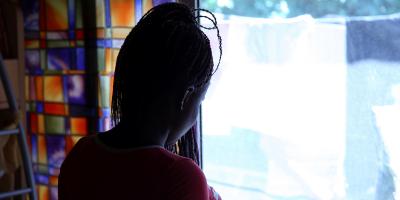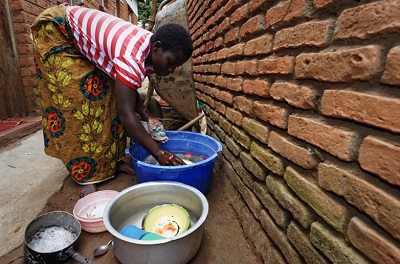
They expected things to be different.
When the seven women boarded their planes in Morocco, Tunisia and Cote d'Ivoire, the future seemed bright. Their passports and tickets to Liberia had been arranged and paid for. They were on their way to earning US $1,000 a month to work in supermarkets and restaurants. Tony, the man who had arranged everything for them, was a friend of friends. They felt themselves to be in good hands.
Their impressions changed rapidly once they arrived. First, their passports were seized. Then, the promised salary was reduced to $500 and a monthly sum deducted to cover their airfare. Every day, a bus shuttled them back and forth between 12-hour shifts at a bar in central Monrovia and their lodgings in an isolated building, about 8km away. Tony accompanied them, wherever they went.
As time passed, their situation deteriorated. They stopped being paid for their work. Tony began collecting money from the bar’s male customers and demanded that the women have sex with them. They had no choice; if they refused, they were threatened and beaten.
Domestic and transnational trafficking in Liberia

The women’s story is not a unique case. Liberia is a known transit and destination country for human beings subjected to forced labor and sex trafficking, though trafficking in persons manifests itself predominantly within the country’s borders.
Women and children from rural areas are among the most vulnerable, lured by the promise of education, better living conditions or a good job in the city. Traffickers are mostly extended family members or trusted persons from the community. Generally, victims end up forcibly employed as beggars or street vendors, in diamond mines, on rubber plantations, as sex workers or in domestic service. They often receive no pay; if they do, their ‘guardian’ confiscates the money.
Transnational trafficking on the other hand is more likely to be carried out by organizations, mostly offering lucrative employment which turns out to be a sham. Liberia has also seen an influx of young women from other countries in West Africa trafficked by their parents for forced or arranged marriages. The victims are held captive in their matrimonial homes, without access to the outside world and often without any identification documents.
“Trafficking, like many other crimes, thrives on ignorance”
Chief Inspector Zebedee S. Saywrayne remembers the moment he first came across the case of the seven women, back in 2013. At the time, he was serving as Chief of Operation for the Anti-human Trafficking Unit of the Women and Children Protection Section of the Liberia National Police. “I went to meet the section commander at the police station on Center Street. While at the depot, one of the women came in with a complaint that her salary was being withheld,” he said. As he listened to her story, he immediately recognized that she had been trafficked. The very next day, in the early hours of the morning, the women were rescued.
Many other police officers would not have made that connection. Especially in rural areas, law enforcement authorities often do not understand the definition and scope of trafficking and its implications. The lack of awareness about the crime extends to communities that may not recognize warning signs, and victims themselves who do not realize they have fallen prey to traffickers. Furthermore, while there have been ad-hoc studies facilitated by international partners on the situation of trafficking in persons in Liberia, there have been no national studies to collect information on the prevalence of trafficking.
“Trafficking, like many other crimes, thrives on ignorance,” warned Abraham Mitchell, a lawyer working for the Ministry of Justice. “The lack of understanding and data has served as a hindrance to the fight against the crime and has worked in the interest of the perpetrators. I confess that when human trafficking was criminalized in 2005, even I knew hardly anything about it; this was the case for virtually everyone working in the security sector.”
Liberia has a legal and policy framework prohibiting trafficking in persons, including a National Anti-Human Trafficking Action Plan and Task Force, both established in 2013. However, Liberian police, judges and prosecutors lack the necessary skills and knowledge to prevent or identify, investigate and prosecute offenses. Police officers have received little anti-trafficking training, and units do not have the resources to investigate suspected cases or offer comprehensive protection to witnesses. Coordination is weak between the various agencies working to support survivors.
"Trafficking, like many other crimes, thrives on ignorance. The lack of understanding and data has served as a hindrance to the fight against the crime and has worked in the interest of the perpetrators." - Abraham Mitchell, Ministry of Justice, Liberia
Capacity, collaboration, communication
Recognizing the importance of increased capacity as well as multi-stakeholder collaboration, IDLO has begun implementing a program, supported by the United States Department of State, to help the Liberia National Police and other stakeholders effectively address trafficking cases and improve the inter-agency response mechanisms in place to support survivors.
Explaining what the program seeks to accomplish, IDLO’s Country Manager Teresa Mugazda highlighted the importance of putting survivors at the heart of the response to trafficking.
“IDLO is helping police officers learn how to identify trafficking victims in the first place, and how to deal with them once they have been identified – without putting them at risk or further re-victimizing them,” she noted. “Through our program, we aim not only to help officers handle the investigations in an affirming manner for the victim, but also to encourage them to coordinate with stakeholders that provide support to survivors.”
IDLO’s program will also seek to increase public awareness of trafficking through community-based initiatives, aimed at increasing at-risk subjects’ ability to recognize the methods used by traffickers and avoid falling victim to them.
"IDLO is helping police officers learn how to identify trafficking victims in the first place, and how to deal with them once they have been identified – without putting them at risk or further re-victimizing them." - Teresa Mugazda, IDLO Country Manager in Liberia

